Noida-based start-up YesMadam (a salon-at-home platform) has come under criticism lately after a leaked email by the HR was shared by one of its employees on the social media platform LinkedIn.
Here’s a flow of what the start-up did: First they conducted a workplace survey to understand the stress level of employees. Following this, the company highlighted that to ensure that no one remains stressed at work, they decided to part ways with employees who indicated significant stress.
The e-mail sent by the company’s HR, Ashu Arora Jha, says, “To ensure that no one remains stressed at work, we have made the difficult decision to part ways with employees who indicated significant stress.”
The company has highlighted that this decision is effective immediately, and impacted employees will be given the details separately. What followed after this was a discussion all over the internet about workplace toxicity and how this move is ruthless. Taking to LinkedIn, Anushka Dutta, a UX copywriter at the Noida-based start-up, highlighted that first the company conducted a random survey and then they were fired overnight.
Dutta, who was also fired, wrote, “And, not just me, 100 other people have been fired too.” Details such as whether the employees will get severance pay or have to serve a notice period are not known yet.
While some have criticized the move, others have highlighted that this might be a PR stunt. “Not sure if it’s a PR stunt or a weird way to show insensitivity towards employees,” wrote Sreoshi Bakshi, a user on LinkedIn.
Speaking about the same, Saurabh Parmar, Fractional CMO & CGO, told Outlook Business that if at all this is a PR move, then they have a terrible PR agency.
“There's this growing myth among some founders and marketers that 'all publicity is good publicity.' People don't buy something because it's popular; they buy something because they trust it—and that's especially true in low-trust economies like India.,” added Parmar.
While there is no confirmation about it being a PR stunt, one example of a PR stunt that received criticism is that of Indian model Poonam Pandey. The model faked her own death to promote awareness about cervical cancer in India.
In February this year, her Instagram post read, “This morning is a tough one for us. Deeply saddened to inform you that we have lost our beloved Poonam to cervical cancer.”
Now, coming back to the debate on work culture, Yukti Gaur, co-founder and CEO at IP India, wrote that a lot of employees who got fired at YesMadam won't speak out in public on what happened. This is because employees fear a lot of things, including not getting their final salaries, not getting their relieving letter, and more.
So, what should YesMadam do now? Parmar believes that the company should apologize and take corrective actions, such as re-engaging with the employees and acknowledging the mistake.
Discussions around workplace toxicity have been increasing recently. A report by the Confederation of Indian Industries (CII) and digital healthcare platform MediBuddy released in July this year highlights that work-related burnout is experienced by around 62 percent of employees.
Additionally, a report titled “Insights from India's Best Workplaces in Health and Wellness 2023” released by workplace recognition organization Great Place To Work India has highlighted that one in four employees struggles to speak up about mental health issues at the workplace.
Speaking about concerns about workplace toxicity, Vidya Dinakaran, a Chennai-based psychotherapist, told Outlook Business earlier that corporate employees often face signs of burnout and exhaustion. “When I start a session by asking how they are, many respond with a heavy sigh and say, ‘I'm just surviving.’ Toxicity in the workplace describes an environment that overlooks the fact that work is just one aspect of life,” said Dinakaran earlier.
The debate around workplace toxicity at start-ups has been gaining momentum recently. To give an example, recently, Daksh Gupta, CEO of AI startup Greptile, came under criticism for endorsing long working hours. Gupta, who has promoted 84-hour work weeks, has also defended the same. He wrote on X, “Typical workdays start at 9 am and end at 11 pm, often later, and we work Saturdays, sometimes also Sundays. I emphasize the environment is high stress, and there is no tolerance for poor work.”
Additionally, when it comes to layoffs, it becomes important to make it objective and rational. There are several instances where employees have been laid off via a Zoom call. For example, Indian-origin CEO Vishal Garg, CEO of mortgage firm Better.com, fired around 900 of his employees via Zoom call in December 2021.
A research paper titled ‘A Study of Needs and Challenges of Human Resource Management in Start-Up Companies’ published in 2023 says that firing an employee should be a well-documented, objective, and performance-based procedure. “Don't let the firing come as a shock. Before terminating an employee, always offer them a warning and an opportunity to alter their conduct or actions,” it says.
Another example of workplace toxicity in Indian start-ups has been when a Reddit user accused quick commerce platform Zepto of workplace toxicity. The anonymous user wrote on the platform that the company promotes 14 hours of work every day. The post reads, “Aadit starts work only at 2 pm because he cannot wake up early, and meetings are set up at 2 am in the mornings.”
Following this, Zepto co-founder Aadit Palicha wrote on social media platform X that he has nothing against work-life balance, and he encourages it for all his competitors. Some start-up founders have glorified working for long hours. They often argue that in its growth stage, the companies need more labor. Bombay Shaving Company’s CEO Shantanu Deshpande had in 2022 also pointed out that a new joiner should work for around 18 hours in the first 4-5 years.
Start-Ups Must Adopt Realistic Goals, Say Experts
Experts suggest that start-ups, though promising and full of opportunity, typically function in high-pressure settings with limited resources, where employees take on various roles.
“However, this dynamism must be balanced with a strong commitment to employee well-being. Building a culture that values people as much as performance is the foundation for long-term sustainability,” said Shantanu Rooj, Founder and CEO, TeamLease Edtech.
Meanwhile, Parmar has highlighted that being part of a startup means dealing with uncertainty and hardship. “In reality, many startups demand long hours, but those entering this space should be clear-eyed about the challenges ahead. It’s crucial for start-ups to communicate these challenges honestly to their employees, so they know what they are signing up for,” added Parmar.
However, Parmar echoed that difficulty doesn't mean toxicity. He added that employees shouldn’t be expected to sacrifice their personal lives without fair compensation or recognition. Voicing the same sentiment, Rooj said, “Start-ups must adopt realistic goals and timelines, recognizing that overburdening employees can lead to diminished productivity and innovation.” Experts suggest initiatives like no-meeting days, flexible hours, and mandatory time off to alleviate stress and promote balance. It will be interesting to see how YesMadam navigates through the situation as the criticism keeps increasing.
































